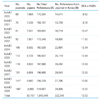Abstract
Researchers and journal editors need to be familiar with the major and most widely-used indexing databases. The specific and sensitive searching ability of medical databases always help researchers to avoid redundant studies as well as to provide background to their work. The important medical databases from Korea are KoreaMed, KoreaMed Synapse, KoMCI and KMBase. Major international databases are WPRIM, Medline/PubMed, PubMed Central, Web of Science, SCOPUS, digital object identifier/CrossRef, Google Scholar, EMBASE, Biosis Previews, Worldwidescience.org, and the Cochrane Library. Although every database from Korea is freely accessible to anyone, some international databases require subscription fees. This is the reason why PubMed and PubMed Central, free access databases, have become the most important and widely used ones internationally. Easier access to databases not only from the Web but also from mobile environment applications will continue to develop. Physicians and researchers should be able to use both Web and mobile databases for better patient care and research. Editors should try to add their journals not only to databases from Korea but also to international databases in order to promote the health of all mankind by disseminating the medical information.
Figures and Tables
Figure 3
Digital object identifier (DOI) presented in the heading of the paper from Journal of Educational Evaluation for Health Professions (© 2009 National Health Personnel Licensing Examination Board of the Republic of Korea).

References
1. KoreaMed [Internet]. c1997-2010. cited 2010 Jun 10. Seoul, KR: The Korean Association of Medical Journal Editors;Available from: http://www.koreamed.org/.
2. KoreaMed Synapse [Internet]. c1997-2010. cited 2010 Jun 10. Seoul, KR: The Korean Association of Medical Journal Editors;Available from: http://synapse.koreamed.org/.
3. KoMCI [Internet]. 2001-2010. cited 2010 Jun 10. Seoul, KR: The Korean Academy of Medical Science;Available from: http://www.komci.org/.
4. KMBase [Internet]. 2010. cited 2010 Jun 10. Cheongju, KR: Medric;Available from: http://kmbase.medric.or.kr/.
5. Western Pacific Regional Index Medicus [Internet]. 2010. cited 2010 Jun 10. Beijing, China: Western Pacific Regional Center, WHO;Available from: http://wprim.org/.
6. PubMed [Internet]. 2010. cited 2010 Jun 10. Bethesda, MD, US: National Library of Medicine, USA;Available from: http://pubmed.org/.
7. PubMed Central [Internet]. 2010. cited 2010 Jun 10. Bethesda, MD, US: National Library of Medicine, USA;Available from: http://pubmedcentral.org/.
8. Web of Science [Internet]. 2010. cited 2010 Jun 10. Philadelphia, US: Thomson Reuters;Available from: http://www.isiknowledge.com/.
9. SCOPUS [Internet]. 2010. cited 2010 Jun 10. Amsterdam, NE: Elsevier V. B.;Available from: http://scopus.com/.
10. Digital Object identifier System [Internet]. c1998-2010. cited 2010 Jun 10. Oxford, UK: International DOI Foundation;Available from: http://doi.org/.
11. CrossRef [Internet]. 2000-2010. cited 2010 Jun 10. London, UK: CrossRef;Available from: http://crossref.org/.
12. Google Scholar [Internet]. 2010. cited 2010 Jun 10. Seatle, US: Google;Available from: http://scholar.google.com/.
13. EMBASE [Internet]. 2010. cited 2010 Jun 10. Amsterdam, NE: Elsevier V. B.;Available from: http://embase.com/.
14. Worldwidescience.org [Internet]. 2010. cited Jun 10. [place unknown]: WorldWideScience Alliance;Available from: http://worldwidescience.org/.
15. The Cochrane Library [Internet]. 2010. cited 2010 Jun 10. Oxford, UK: Cochrane Collaboration;Available from: http://www.cochrane.org/.
16. The Korean Association of Medical Journal Editors [Internet]. c1996-2010. cited 2010 Jun 10. Seoul, KR: The Korean Association of Medical Journal Editors;Available from: http://kamje.kr/.
17. JCR Web [Internet]. 2010. cited 2010 Jun 10. Philadelphia, US: Thomson Reuters;Available from: http://www.isiknowledge.com/.
18. National Library of Medicine(NLM) Catalog [Internet]. 2010. cited 2010 Jun 10. Bethesda, MD, US: National Library of Medicine, USA;Available from: http://www.ncbi.nlm.nih.gov/nlmcatalog?itool=sidebar.




 PDF
PDF ePub
ePub Citation
Citation Print
Print






 XML Download
XML Download